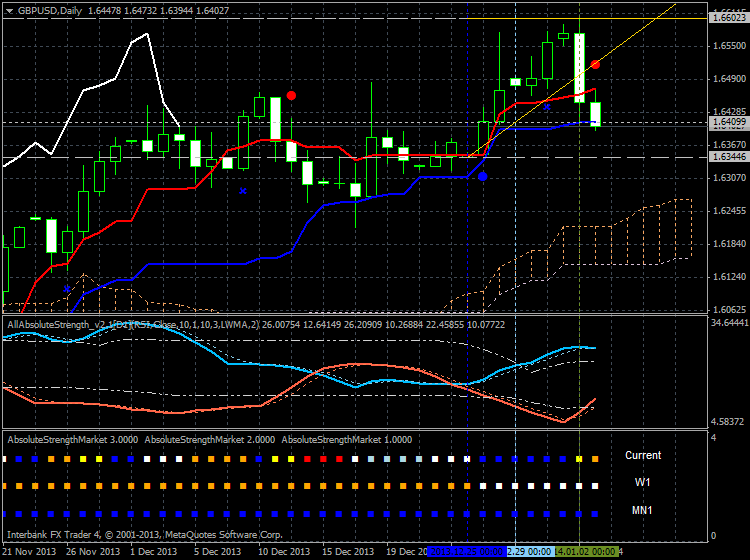Forex - Weekly outlook: December 23 - 27
The U.S. dollar ended the week higher against most of its major counterparts, as demand for the greenback remained supported after the Federal Reserve announced plans to begin tapering its monthly bond-buying program.
The Fed announced Wednesday that it would reduce its USD85 billion-a-month bond buying program by USD10 billion in January. In his last press conference as Fed Chairman Ben Bernanke said the economy was continuing to make progress.
The U.S. central bank reiterated that interest rates are likely to remain low even after the unemployment rate drops below 6.5%, the threshold at which the Fed has previously said it would start to consider rate increases.
The Commerce Department said Friday that the U.S. economy expanded by 4.1% in the third quarter, well above initial estimates for 3.6% growth.
USD/JPY rose to 104.64, the highest level since October 2008, before turning lower to settle down 0.14% at 104.09 as investors locked in profits.
Following a two-day meeting, the Bank of Japan kept its pledge to expand the monetary base by an annual JPY60 trillion to JPY70 trillion, in line with expectations.
EUR/USD fell to 1.3625, the weakest level since December 6, before turning higher to end up 0.07% at 1.3671.
Standard & Poor's cut the European Union's long-term credit ratings to 'AA+' from 'AAA' over concerns that E.U.'s financial profile has deteriorated while cohesion among E.U. members has lessened, though the euro shrugged off the news.
Meanwhile, the pound ended lower on Friday, with GBP/USD shedding 0.27% to end at 1.6329. Official data showed that the U.K. gross domestic product expanded by 0.8% in the third quarter, in line with previous estimates.
Elsewhere, the Canadian dollar ended Friday’s session higher against its U.S. counterpart after official data revealed that the country's consumer price index came in flat in November compared to expectations for a 0.2% fall. Core consumer price inflation, which excludes the eight most volatile items, ticked down 0.1% last month, confounding expectations for a 0.1% rise.
A separate report showed that retail sales in Canada slipped 0.1% in October, disappointing expectations for a 0.3% rise. Core retail sales, which exclude automobiles, increased by 0.4% in October, compared to expectations for a flat reading.
In the week ahead trading volumes are expected to remain light due to the Christmas holiday and as many traders already closed books to lock in profit before the end of the year, reducing liquidity in the market and increasing the volatility.
Meanwhile, the U.S. is to release key reports on durable goods orders, new home sales and jobless claims.
Ahead of the coming week, Investing.com has compiled a list of these and other significant events likely to affect the markets.
Monday, December 23
Markets in Japan will remain closed in observance of the Emperor's Birthday.
The U.S. is to produce government data on personal spending and expenditure, while the University of Michigan is to release revised data on consumer sentiment and inflation expectations.
Meanwhile, Canada is to release monthly data on gross domestic product, the broadest indicator of economic activity and the leading measure of the economy’s health.
Tuesday, December 24
Markets in Germany will remain closed in observance of Christmas Eve, while France is to release data on consumer spending.
The U.S. is to release data on durable goods orders, a leading indicator of production, as well as a report on new home sales.
Wednesday, December 25
Markets in Australia, New Zealand, Europe, the U.K., Switzerland, Canada and the U.S. will remain closed for the Christmas Day holiday.
Thursday, December 26
Markets in Australia, New Zealand, Europe, the U.K. and Canada will remain closed in observance of Boxing Day.
Meanwhile, the Bank of Japan is to publish the minutes of its latest policy meeting, which contain valuable insights into economic conditions from the bank’s perspective.
Later in the day, the Labor Department is to release the weekly report on initial jobless claims.
Friday, December 27
Japan is to release a series of data, including reports on household spending, inflation, retail sales and industrial production.
Meanwhile, the U.S. is to round up the week with a report on crude oil supplies.


 5Likes
5Likes LinkBack URL
LinkBack URL About LinkBacks
About LinkBacks










 Reply With Quote
Reply With Quote








Bookmarks